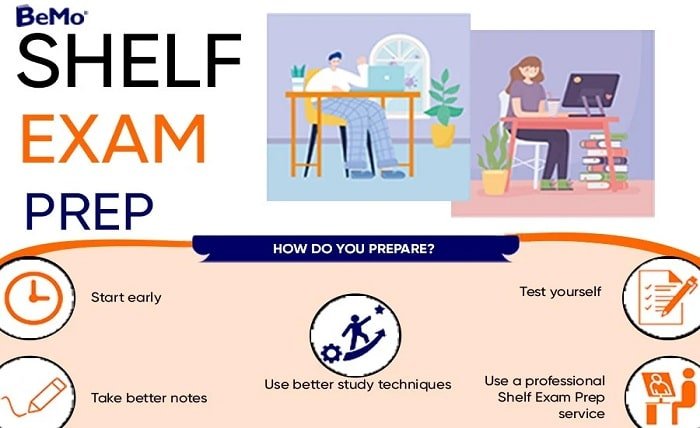Expert Strategies for Scoring High on SHELF Exams

Scoring high on the Clinical clerkship exams is crucial for medical students aiming to excel in their clinical rotations and residency applications. These exams test knowledge and clinical application across various specialties, making thorough preparation essential. Employing expert strategies can significantly enhance performance, providing a competitive edge. This guide presents comprehensive strategies to help students maximize their scores. By following these tips, students can approach the Clinical clerkship exams with confidence and achieve outstanding results.
Understand the Exam Blueprint
Understanding the exam blueprint is a fundamental step in SHELF exam preparation. Each exam covers a specific clinical discipline, such as internal medicine, surgery, or pediatrics. Familiarizing yourself with the content outline and the weight of different topics helps in creating a targeted study plan. This knowledge allows you to allocate study time effectively, ensuring that all critical areas are covered. Additionally, understanding the exam structure reduces anxiety and helps you approach the test more strategically.
Develop a Comprehensive Study Schedule
Creating a comprehensive study schedule is essential for organized and effective preparation. Start by breaking down the study material into manageable sections and assigning specific topics to each study session. Incorporate regular review periods to reinforce retention and understanding. Balance your schedule to include high-yield topics and areas where you need improvement. Consistency and adherence to your schedule are crucial for cumulative knowledge building and sustained study momentum.
Use High-Yield Study Resources
Utilizing high-yield study resources is a key strategy for efficient learning. Textbooks, review books, and online platforms like UWorld, First Aid, and OnlineMedEd provide focused content tailored to Clinical clerkship exams. These resources highlight essential information and common test topics, allowing you to study smarter, not harder. Regularly review these materials and supplement them with class notes to ensure a comprehensive understanding. High-yield resources save time and increase the effectiveness of your study sessions.
Practice with Clinical Vignettes
Practicing with clinical vignettes is crucial for developing problem-solving skills and clinical reasoning. The Clinical clerkship exams often include case-based questions that test your ability to apply knowledge in real-world scenarios. Use question banks and practice exams to familiarize yourself with this format. Analyzing clinical vignettes helps you think critically and make connections between symptoms, diagnoses, and treatments. Regular practice with these scenarios prepares you for the type of questions you will encounter on the exam.
Join Study Groups for Collaborative Learning
Study groups can significantly enhance your preparation through collaborative learning. In a study group, you can discuss complex topics, quiz each other, and share valuable resources. Explaining concepts to peers reinforces your own understanding and highlights areas needing further review. Additionally, study groups provide motivation and support, reducing the isolation often associated with intense study periods. Collaborative learning leverages collective knowledge, leading to a deeper and more comprehensive understanding of the material.
Focus on Weak Areas
Identifying and focusing on weak areas is crucial for a balanced and effective study plan. Use practice exams and self-assessments to pinpoint subjects where you struggle. Devote additional study time to these areas, employing various resources and techniques to reinforce understanding. Addressing weaknesses ensures a well-rounded knowledge base and increases your confidence in tackling challenging questions. Regularly revisiting and reviewing these areas prevents gaps in your knowledge.
Incorporate Active Learning Techniques
Active learning techniques enhance retention and understanding, making study sessions more productive. Techniques such as summarizing information, creating flashcards, and teaching concepts to others engage multiple cognitive processes. Active learning helps solidify knowledge and improves recall during exams. Incorporate these techniques into your study routine to make learning interactive and dynamic. Active engagement with the material promotes deeper comprehension and long-term retention.
Utilize Online Resources and Practice Exams
Online resources and practice exams are invaluable tools for Clinical clerkship exam preparation. Platforms like UWorld and NBME offer extensive question banks and practice tests that mimic the actual exam format. Regularly practicing with these resources helps you become familiar with question styles and time constraints. Reviewing practice exam results allows you to identify patterns in your performance and adjust your study strategies accordingly. Consistent use of online resources enhances your test-taking skills and confidence.
Maintain a Healthy Study-Life Balance
Maintaining a healthy study-life balance is essential for sustained productivity and well-being. Ensure you allocate time for exercise, relaxation, and social activities to avoid burnout. A balanced lifestyle supports mental and physical health, improving cognitive function and study efficiency. Adequate sleep, a nutritious diet, and regular physical activity are crucial components of a healthy routine. Taking care of your overall well-being enhances your ability to study effectively and retain information.
Seek Guidance from Mentors and Peers
Seeking guidance from mentors and peers provides valuable insights and support during your preparation. Experienced mentors can offer advice on study strategies, resources, and time management. Discussing your progress with peers allows you to share tips and address common challenges. Constructive feedback from others helps you refine your approach and stay motivated. Leveraging the knowledge and experience of mentors and peers enriches your preparation and boosts your confidence.
Conclusion
Scoring high on the Clinical clerkship exams requires a strategic approach, incorporating comprehensive preparation, effective study techniques, and consistent practice. Understanding the exam blueprint, developing a detailed study schedule, and using high-yield resources form the foundation of successful preparation. Practicing with clinical vignettes, joining study groups, and focusing on weak areas enhance understanding and retention. Incorporating active learning techniques, utilizing online resources, and maintaining a healthy study-life balance ensures a well-rounded preparation. Seeking guidance from mentors and peers adds valuable support and insights, helping you achieve your best performance on the Clinical clerkship exams. By following these expert strategies, medical students can maximize their potential and excel in their clinical assessments.




